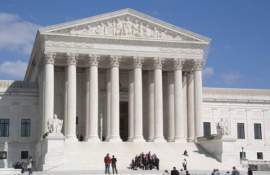
Understanding Judicial Activism

The United States Supreme Court has received a lot of criticism for not keeping within Constitutional bounds, while practicing judicial activism, as many people believe that instead, the primary purpose of the Supreme Court should be to interpret laws in an act of judicial restraint.
Judicial activism is a term used to describe judicial proceedings that are based on personal and political thought rather than through the interpretation of currently existing laws. Judicial activism is usually described as occurring if laws have been overturned and deemed unconstitutional, judicial precedent has been overturned, and a ruling has been made against a popular interpretation of the Constitution. By contrast, judicial restraint is the practice of judges interpreting judicial proceedings by limiting their own power and only discrediting laws if they are obviously unconstitutional beyond any doubt.
Debate Against Judicial Activism
Opponents of the excessive use of judicial activism argue that such repeated behavior undermines the power of other branches of government who make enforced laws, as it damages the very purpose and foundation of law and democracy. If there is no real conflict over the legitimacy of laws in the Constitution, elected Supreme Court judges have no grounds to strike down policy written and voted upon by similarly elected officials. On the other hand, judicial activism is defended as being a form of judicial review, as it is the job of Supreme Court judges to oversee policies created by elected officials and ensure that existing laws are not conflicting with newly created statutes.
Even as proponents claim that it is merely a way of interpreting a law as their job entails, critics suggest that important laws cannot exist based solely on the discretion of Supreme Court judges who make the final word. President Lincoln once remarked that if Government legislation became solely dependent on decisions of the Supreme Court, the people of the United States will cease to be their own rulers.
Important Cases of Judicial Activism
There have been several examples of conservative judicial activism in which Supreme Court judges have overturned a specific law which they have deemed unconstitutional, igniting controversy.
Lochner v. New York
The case itself was a landmark decision that concluded that the "liberty of contract" (a term used to describe the right to formulate contracts without governmental interference) was implicit in the Due Process Clause of the Fourteenth Amendment. The case centered around a New York law which stated that the maximum amount of hours a baker may work should be 60 hours a week and the limit on each day should be 10 hours.
By a 5-4 vote, the Supreme Court judges ruled that the law was unnecessary to protect the health of works and found that it was a labor law that interfered with the right to create a contract without any interference. The labor law of New York was described as being an "unreasonable, unnecessary and arbitrary interference with the right and liberty of the individual contract".
Other cases of judicial activism include:
● Lochner v. New York
● Brown v. Board of Education
● Plessy v. Ferguson.
NEXT: Justinian Code





















